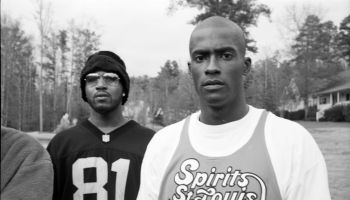Test the evidence.
That’s what Willie Jerome Manning and his legal team have been asking the state of Mississippi to do over the past ten years, since being sentenced to death in 1994 for killing the two White Mississippi State University students. He has maintained his innocence throughout the case.
RELATED: George Stinney: The Youngest Person Ever Executed In The U.S.
Jon Steckler and Tiffany Miller‘s bodies were found in Oktibbeha County Dec. 11, 1992. Both were shot to death. Miller’s car was missing, but was located the next day. Prosecutors claim Manning was arrested after allegedly trying to sell items from the victims.
The evidence used to convict him was incriminating but not exact. Hairs from an African-American male were found in Miller’s vehicle, though DNA analysis at the time was not sophisticated enough to determine if they actually belonged to Manning.
It didn’t matter; he was convicted for both murders and sentenced to death. Manning is set to be executed May 7.
It’s that simple: The prosecution did not know for certain that Manning was the right Black man, though it was clearly enough to sentence a possibly innocent man to death. That, some 20 years later, new testing technology exists that could exonerate him and point to the real killer seemingly means nothing.
Manning’s case is tragic, but unfortunately, not uncommon.
Amnesty International reports that, since 1977, the overwhelming majority of death row inmates have been executed for killing Whites, even though Blacks make up about half of homicide victims. Diann Rust-Tierney, Executive Director of the National Coalition To Abolish The Death Penalty, told NewsOne that Manning and other people of color are at an extreme disadvantage when they are accused of killing Whites.
RELATED: The Top 5 Most Wrongful Executions Of All-Time
“You can have a case where there is circumstantial evidence,” Rust-Tierney said. “There’s evidence that hasn’t been tested and you can still get a conviction. So I think one of the things we see is that the death penalty and the way it operates actually increases the risk that the wrong person will be subjected to the death penalty by the very nature of the process.”
Over the years, Manning’s legal team has filed countless motions citing faults with the process used to convict their client. One is of a jailhouse witness who claims Manning confessed to the murders but later admitted that he lied. Perhaps the most disturbing complaint was with the approach the prosecution used to select jurors. Some Blacks were reportedly disqualified from sitting on the jury because they read Black magazines.
RELATED: Supreme Court Halts Texas Execution Due To Racist Testimony
Unfortunately, each time Manning has presented the aforementioned arguments, among others, before various courts, judges have sided with the defense.
(The U.S. Supreme Court refused to hear the case)
There was a glimmer of hope that their losing streak would end last week, when the the Mississippi Supreme Court ruled on whether to allow evidence from the murder case to be tested. The court narrowly ruled 5-4 in favor of the defense. In the majority opinion, Associate Justice Michael Randolph said Manning’s conviction was based on more than what his defense was challenging.
“The absence of Manning’s DNA does not preclude his participation in the crimes charged,” Randolph said. “Manning fails to demonstrate a reasonable probability that he would not have been convicted or would have received a lesser sentence if favorable results had been obtained through such forensic DNA testing at the time of the original prosecution.”
In a dissenting opinion, however, Associate Justice Leslie King found fault with the prosecution’s handing of the hairs.
“Should a DNA test demonstrate that the African-American hairs found in Miller’s cart did not belong to Manning, then the infirmity in the prosecution’s emphasis on the importance of the evidence would be exposed. And it would certainly raise reasonable questions regarding Manning’s guilt,” King said.
But with fewer than four days left until Manning’s execution, his legal team has run out of options. Robert Mink, one of Manning’s attorneys, told NewsOne that they’ve taken their case to Gov. Phil Bryant, hoping Mississippi’s top executive will do what the courts so far have refused to do.
“We’re hoping that the governor will stay the execution long enough to allow the DNA testing to occur,” Mink said. “It won’t take long. We’re talking about something that can be accomplished in 30 days. We see no good reason not to do the testing when there is evidence that could be highly probative. It could I identify the real perpetrator.”
According to the Innocence Project, 306 people have been exonerated post-conviction after DNA testing proved their innocence; 190 of those exonerated were African-American. The true perpetrators or suspects were identified in 148 of the 306 exonerations.
Supporters have set up a website, “Justice4Willie.” On the upper right side of the homepage is a Change.org petition asking that Gov. Byrant to stay Manning’s execution. So far it has 544 signatures as of 12:20 p.m. EST.
In a recent interview with the Natchez Democrat newspaper, Steckler’s sister, Suzanne, said Manning’s death will not help her feel any better.
“This is just my personal opinion, and I won’t speak for the rest of the family, but it doesn’t bring our brother back,” she said. “Because of that, we don’t wish that ill will on anyone else’s family. I don’t believe (Manning’s) death helps us in one way or another.”
Miss. Refuses Death Row Inmate DNA Test That Could Prove Innocence was originally published on newsone.com














